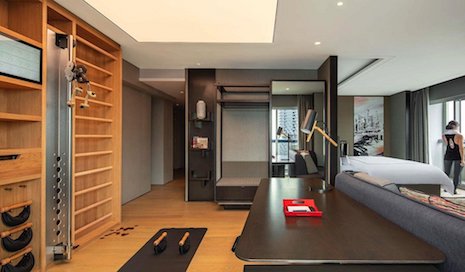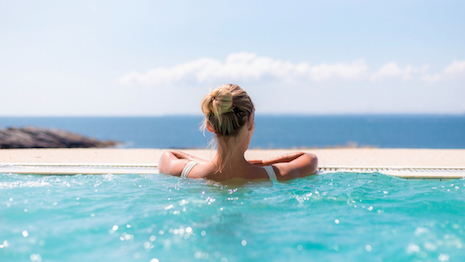Hospitality group AccorHotels is tracing the rise of the wellness movement and the related opportunities for the travel sector in a whitepaper designed to help guide its own health-conscious efforts around the globe.
The company, which includes the Fairmont, Raffles and Sofitel brands, is outlining both the growing wellness expectations of travelers and the ways in which its own hotels are strategizing to meet expanding consumer demands. By leveraging data, the report seeks to identify the commercial impact and opportunity of wellness in the luxury hospitality business.
"Wellness is not a trend, it is a societal shift and a wonderful one at that," said Emlyn Brown, global vice president, well-being at Accor. "Wellness has moved beyond the walls of the spa to embrace healthy and nourishing food and beverage offerings, challenging fitness activities, adventurous outdoor experiences, a focus on sleep quality and even stimulating intellectual and artistic pursuits.
"As a result, our wellness product is more well-rounded than in the past, our teams have a deeper understanding of the wellness realm and our guests bring an increased level of anticipation and appreciation for quality," he said. "This drives us to connect the spa or wellness experience with so many other services and areas of the hotel while constantly innovating and improving to keep our guests satisfied and engaged."
Health is wealth
Wellness is a broad trend, with a Foresight Factory survey finding 77 percent of consumers take steps to be healthier on a daily basis. This could mean dietary choices, exercising or managing their stress.
Fifty-six percent of affluent travelers in a YouGov study said that being healthier is their top goal for the coming year. There has also been a rise in Google searches and social media conversations around wellness topics.
Consumers are searching for travel experiences that align with wellness. Forty-one percent of respondents in a Foresight Factory poll said they get away to relax, while 22 percent want to get closer to nature during their trips.
While wellness is a common goal, travelers note difficulties in sticking with routines and plans when away from home. In an On Call International survey of business travelers from the U.S., 54 percent said they are less likely to exercise while traveling, while 44 percent note eating more unhealthily when on the road.

Swissôtel Vitality Room. Image credit: Accor
Helping guests stay on track, Fairmont offers a gear lending program and a partnership with Technogym to provide equipment, including an in-room exercise ball on request (see story). Raffles creates dishes designed to promote a healthy gut and offers sleep rituals to help guests get rest and recover from jet lag.
With Wallpaper magazine, Swissôtel created a Vitality Room that features a yoga station, healthy snacks and lighting that is timed to the guests' circadian rhythm.
Pullman Hotels and Resorts has a Bootcamp program modeled after U.S. military training. In addition to on-property fitness classes and outdoor fitness trails at select properties, Pullman has created a YouTube series featuring U.S. Navy and TRX coach Sarah Hoey.
Pullman's Bootcamps
Beyond just meeting traveler expectations, wellness can have a business impact for hospitality. Accor found that travelers who mention wellness in their feedback are 38 percent more apt to give their hotels a high satisfaction score, an indicator of loyalty and return visits.
Wellness travelers are also particularly valuable, since the Global Wellness Institute found they spend 53 percent more on international trips and 178 percent more on domestic travel.
Aside from travelers, Accor sees wellness as a way to engage local clientele on a more regular basis. Fifty-six percent of an urban hotel’s spa business comes from locals, and for resorts one-third of revenues are attributed to local consumers, according to CBRE.
The report also points to the possibilities for Accor from a diversification standpoint, since the group could potentially work with companies in other sectors.
From a marketing perspective, wellness is considered a “happy message” for the group’s brands.
"Accor’s well-being whitepaper will act as a catalyst to help energize the company’s wellness teams globally, while also informing and enhancing the five key pillars that guide Accor’s overall approach to well-being: Active Nutrition, Holistic Design, Bodies in Movement, Leveraging Spa and Embracing Mindfulness – all of which are adapted and adopted by the company’s hotel brands based on a number of important factors including guest preference, demographic, brand positioning, culture and location," Mr. Brown said.
"The report also explores numerous economic and social factors that are driving the rise of wellness around the world, so the group can make its strategy accordingly," he said.
Well-being while on the move
Interest in wellness travel is not losing momentum, according to industry experts speaking on a panel at Condé Nast Traveler’s Points of View Summit.
From cruises and spas to family resorts, the hospitality industry continues to add wellness offerings such as fitness, healthy meals, spa treatments and digital detoxes. While interest in wellness travel is present across generations, different demographics have different interpretations of wellness (see story).
More than 80 percent of affluents are interested in wellness travel, as global demand grows for experiences that emphasize physical and mental well-being.
According to a new report from Altiant, less than 70 percent of high-net-worth individuals feel relaxed despite high levels of happiness and wealth. Chinese affluents report the lowest levels of happiness while being the most likely to prefer relaxing trips rather than active vacations (see story).
"The way people travel and move about the world is constantly evolving," Mr. Brown said. "How they organize their lives is also constantly evolving.
"Wellness is today a golden opportunity for the hospitality industry," he said. "Feeling healthy is a universal, emotionally-charged and frequent concern for all demographics of guests and cuts across all areas of life, from daily routines to exceptional, transformative travel experiences.
"Our diverse hotel brands look forward to embracing the challenge of continuously surprising and delighting our guests with new ways to achieve health and well-being during their travels, inspiring them to choose our hotels again and again.
"More globally, Accor is an augmented hospitality group that goes beyond the boundaries of hotels. Accor shapes the way we live, work and play, by augmenting and reimagining hospitality as a series of connected moments, driven by a holistic ecosystem of brands and the services to power them. With wellness, Accor offer guests new and personalized experiences."
{"ct":"MQT1nA5xjPjk5WKI5oLxM4m5\/Ix0ZqKMySPuFQkkSu4PKJsPN+GsVeMVCA\/+IE0R9AEWDJKz\/96H6x\/JLQVd+bqcOLKiHZbEj4D9qSr\/WnVN5FMQlWX5wQD7qATMaK+Pvlb3awb3V8fs\/yINmWeua6qM\/kmJds+XB6Velw+X1u+2BywCt0kgn4yIhJTlDpL1i9jqsqA3ZJm55yqrEHLyN71sM8xuLzfsBYVaq7K1aX7oGJIRVXvHIraUv1uPSUfx1amWMGuIP8UHRcm9FuawBAeclgpmKRXagb+B90uah\/ZyIeDJLp2sMxyDfHKCyRgkacGBb1k0SsGH3MEcWIWIY+uhYU2Z3yOz29ZBCMTEE5XLUfSd8eZpKByjFLtQHMotNBJggOzaast1alMu8FSSHc4R5fAyywIocb3HCnTrLr8sInhmO3teVfJ\/vrW+cT8ZOyF6IWvBLnADDu7c4P5GevKqDDjkp1ylM4lKZiLzPUKgAyUM1Typgo+LRMhAQ9JO6dpFTSH+z\/JxDNd7EeRk++ROAcJHgNk8Uc9wDjlbOoG6nDR\/Qh7aMJuXbE\/zD61jO+KrU0CjzFtImodMZ5UXg9WTe38ye7RdJptPUIntlR6Jb2Gd5Xw05NxGsNmu4shaSJpHg1SAqTmgWQBPNoDoaPsjKzhMLvZ5AbQd0Teo9K+z0oCHmPLTAE8QCu+A4bGGhRPBTECN\/SwHdTfk+JknmHZLtFUC37WYoCUlka2sBYGCerN3VuF2gox3Zz2B3zaI3AUXSmipkKEu\/Ttmxiz1rhYiFQLCf7CU28cyb53lLi0UMPgxOMI5JyX3lof0CfQfXSwaAi3AI1lGPUCaS2Xu3++CdHsXQYmSJhkhPv5fgTi1PP3ak6pK6TbTChyP6VUw8H\/sxcnFhIqCxqcYFAMO+k2c\/gChE1Ln6wzs8CFvmNxPNWREFXHy+zMgNDWKxb74J2GydMf\/joV5Yqep2nRZLrYwF9hgaMvqy3ZRQHdDTAWRoQflD05XLjuDHFSvEv1+iGpIyh2zuOrqFv2bXZXk5qTzbXFhNZLjXPR1hBzSjutD8zvi\/wGfaoxpWgQygoHA3+lCCOVnjEOdC2RExwUsvGlIIOTbgmeoS5VrddNe1YsQVIIDkxEGCW43tqFagE8fHU8DNY75mrmKR5jIxcFtvFtIzbGaOplaStzNJxoUGhNoSw8zzRNNEs+8fQv4EwEfHvmLf2KSk+dudiULzwMyfCI9jrIMMyCFwK4R5bjasLTdnKpZcOuRInAk9LqqmDCcWgbGq\/a3nPGFe3RQdnO5sWZ4oLJgtBORuxBCF1u4+zIfQfWwORkLUBYuwv8CWFZVjePRyBq+1Wgt0GS+uKjAOrGcn0n65O9oxJZO5pglULnxPyP7TpWOTOf8KQEKqVvBNvRH5HOaJ277UoIHYN0S3QFygj0RPIxr87VNAmlDARD5DGPxqTRh272xYvi5LZx791Mmx3wiwmvkKW5GNQGmE\/AiFpVRYpIFjWTsUnocP7ZZwcTdqfKur25a2nL5w3LfmagmZPryCDk9\/\/P6vGEGeVoFIyXC2BunZGNsnWzU4zY+FfQQAfqynvmLvmtiUoT8dsWu\/Oirj5beXZzOSluqmbzC\/fZqMa213GvqDySpLnCivLePtsdd6OvVahQVGMxaRGYx9o8eT9Y7DHOLhBkWQzpCVvHPYYF0LwYFCq6\/L5WPNIv2DKQzXIw\/GCvw1mBQrmBDhF7bNGLIDZiXGbpjuc6dUetYqLZDV7QSmybrkCpISHi67YV6KiU1rJxWeHYxREGRuKRfFebyP0pYJ\/3q5MIVhSAvvj5fPZVrRxySytGzoffPkZrcu8b6y6YCTkeM0zdANkXm7wg+CCG0XKDxNz6DMn9wlWvEFGtCP+FibVrq2xcEuGuw\/ExoKKIhinOO1jSkHBNT0KOHRQqKYM5QV+u003+V0s1FYZgNs683qXYxhaIQnmn\/8pcHb63t15RZqBI16HTkZJ6WunWnVoBWP9LJZms2nyonUmaJOAzVLHbsM\/UHJPStBlSITXqYcDlEOI64m+6KKvf2Mzlms0lhF\/g7391xzutHvUwWr62KN+DyMEvu2K0RVE3DF\/crNNZlKADkvQF\/p5pT3V5m\/RKuFj\/tNlfo7pznorYaWM+9AgjEH1EYLd1XOPxeMxRoIJHCrK+B4DZ658DXxToyseOLh9W9ZGXgd4JJ9k4ZV\/Z\/UWkrk1m\/eM9UNCdyoKocxvWkokLIq\/tzmkzQdW5Pt7LxDrf06peOJmF4MTwDIQpHdhFLfnOuYllqXJkGPvLpemIDZmzkWk3TzBQ7aLzZoJtGXF97gNy+llO8srT8moIpf\/2xugHsnTZ\/vy8iyPZv5HY7Tofwvk5bE6tmV25mMBjoiyb\/HbZqCds0YGa2V95G2hf90q5IpChV8lc4Ksu91XGHowIHbSc5Awmd8yCDiF1FmvGmEWZPV8iAuoQ2ae3hDZ7S\/y\/ZKWsgH7WCXJzy+iV4wxcsqddB18M7KERL38X4P0a5Oj3D4F5UMqkeQRWTQsAU4XQ6AV2MXkS1Wev2e7XeAjlqnCrIpjUMQ6oxOOawVUA3KlVeVWJm\/saJUx43gN6+JaeAMs0vV\/QA3izK7UrpNPJqzhcHEICyJhm1PT7+Lv7iQyaIi14SXFXY+N4Awdp9PUJSBg8\/QlMvE1E0AVQUCZ26Rv4SXLouLoUU\/kHlez379E8RIv3Hm8YTX7mLoeNLN\/\/9VCsdpE8fcV8RO28w4omMtYUh4Petz9pperxTpyAMegXS\/W4FncXPMP6AWqAXN7nVSQwtG8e9rEsIWczYOubZdv8GFagcDDR+KJLvMeSxTemSrrF3XRRdHi54E\/c\/SxKVoqcGHqKN43Cxkr71kz0W3jlcZpTY6Ek0Ed+84cZpRNw47l3O\/QMxEso\/\/QEWAsdCvgJaJdr5E0Z+ggQ3nbZcpbz+MoJ6i+FaVxuDPBwXaPFeqNW\/n8Mv43RGDa48knIEWin\/hRy\/kqN4V0tjzSP\/EEJInAhszpcHODwP7aDngopbD6xFenladUzujSZjnfr7JJG+DG9H31w\/FBg7T6+NebVQmPeudN2dgNtK4WWwSPWmWzo6Ut94u\/IgKJARVmswhs7u6ftUIwFt0UUvFg82Laiq39rDl+pifpOFmO2bF++tiDevRV7iVYKRq1r\/Qi4EjvnT7yJ1\/JY3FVyPeSiCqrXx+jXlAG18LDOm8iMeK4vX8Vur9xc+AurizjCzmbTsgadhf+YlLwcvc0ortdSOkEjoRr1mYSGYzS7p1BGhOcewJ2bX9wUZV4QeVvgXB4k2aeeCh3rjXuhR+I3pvwDp9fOfZqOYlHL7IrprSb7OcVUUHKPfSnlPcyMwBMfIushTDPspt7zTzKonz9kpRIhde1sla\/eRtURE9S6jdEKQ0MYXbNHIlcye3LOlZub7sfLU1Rvn9gFTjoiYx2qMUFcusyT4+DEHUt3RZmEmgUF+s9lSs8VwmlCQ5tdiqpCvificDblB3tQRuhRQjMJcHGDcb0L\/Az8QfU0+llaNP5IBTdiO5w8TzI0K+36vuPCgDRa76Tb4viOlZPdOIbmX40qn2g07BPWyi29ntRUhtOxLyabS167oCBl0yDTozZvs7+d+wZaQ3T4FXrYrZbNzqw9o4snXN+mZtQx1MXXi3Rj9xg8uzd\/WCfqdgT3EW20KF05jwUcY8KL3RewT6p4EM09PTGUD1ctX5HyCw3d46hlUjkbyI2WNnF7nfij\/UPZBJt6JGAzw2adBWPU3ZU9j9DDJZ34+NBj5GeJRkW07taFb38Pi+CyFfOxqkWJpuBxHUKSfGr9fI2yeVXw1WZKg\/\/7qlXlCRmZiIDMz8u3xAZpoUptm23ZoVEn7jpxLIStHPU24y\/77FnU9k\/5y1+FTgyQovCMR1zCJW2CB16K4NDMSydSsSJYEkP0qa2SqABswPah\/Tsbmm1CC4MpRWfuM0UqAr7IN88vgzrhrAloUMadSu+iGRooviyQxrKHFdc0DwdHujQjL2O1J23pOfnk4j8BrTOUkUYUUQmn3PotAs5TzjIE5x6sV+BdyUPu5ukKrTd+MCSTDVmBc93YT6ja2SW8V228fF65m6ftD1vjOHihKl3WsH0IxemcKaahNlR7RmNcR4NvriQ9dfgzhtVespb9aVVc0Rwx5EeXCYLf9YyYwFutCPD5z3nD6w7J770wqgXm8jCLeJ5WZYn4JQwCmw6l\/cUom51MalW5IDsWBBkqIlM7RKwAeICR+ctm5UzjKZeeqDuYCGifLBcgYQ\/PMfG9RVMgPTYLgFtW4HXtbjPI5dcqBTRS6oxcpy9j4sSKV48g35wnk7BIpB+vxBXhZrwwC48Vvf8fCLTlgyBKmS2vvSRv9\/lCR\/j6v87Jpt8aS13jP3kBJIVaBs7DLjtCpJx06XOudE31h\/vMN73VuFZMA4LCt08O+D45X4Oq0rD+xpN4+3X0dKfHWdpD1CMXYO+Toe7VFVFafVYP6swPoqHDo1vLQa2uwjVQM8APidRAZ\/e2zAeTi7is3zB9vgyCh5PzCd+VCMZkxDnV4p4xJWhwUwHRgqJhkbtHzLAArcFO6BHCSk3i3bqv2vPNekqFQlxIGJcsx+vgxov4aKcB6xoOV\/GdqoworZiZi6zevfvKYdkCFLE8evfuyTbOmVqGdu7pFyjh7PjzwBuuTl1Yg54xZ7CUrIKPY8AJe+NXV5PBDa5YVgUHkgn318EHHbU2j5jtuo+DlFNUgcsuMwQLnuAgXQBZqSE65XBwNNPaXBKJsVMbx2dJUjlWiyPO\/Rg8sz+DWhQR0lNiQZi8XemeR1FIMH2f\/VZM6hvR9TwtfVgbYkWL9CWAXwO9Wv8DvUM0AhgDvAzMfkgKwgLt8\/M5TVFpmdyFYGJIhLibeL8us1sqREkx+t4L+b9UtY58E9tb2FRuYM8ICHGbrO7dV2P5G5VHvU81MeKtcY+oIbw2eifSMvanDhwJ7jLyZkIBAGJTLok5jOEOuloKkC8lJTvqDByF+96Pd8nOJIz3LjvOATXpdobKzZbiqhdcvxS\/vCazr07a+5VkefIPcFQEo5C02RXPF1d+mC+EDJ94CSD+g4JipNFKNMGdABVbzRIEHuQYbcqQ7mOSLrx74nE2N2ZeqgvEGOVhY05AwshXoxULPnHsySCMPz8KO2L+yxl3hM0\/fhSTSJzxo4UxAVDRLdKWMva00QpW1GTo6W2J\/T8up+Sihx5mUtEA6Xupq68awCyKJN3VYnKeS0+SHDj1kcBVWnzkhMkn3WkSjEpVSqJPfGzOtnhmCwdM+s0HGnDSjWCAUZDGhQ9+FoqiDfhndjmmR55JzkIS27PuhfU4asZdMuQg0SNedsvfQ9PxbIIKB9Zhig3wfiO5DrGWhyUJremLFrUx4QTLOcNVUu92cpDZRIpXKmqG8vw4KTyl9dteo6ABc+OfbEolnM\/4NlSwKxJW64f4\/uPRJodgrqb+lEPupQJbkjXKe6ssP0WghRChootWFx63F+gUtJc2iaY3eR8Pq7nfSVxUfzBXpuKHRD3ERhhRrFLgGbJT90p2RCVjjsUBlpNDobRzOgYWbcvjX7P1tr4flm8Nw3bzVXXcipgzdfSRJ11AC5lGb98H4qT80YIKwiJAuej244hljZVdhIY6kBrV3edTv2khioLrverQTzLRM3JzL0XpmaOi1e8p2dKZ0EmNvk3DF1Aw7Xgm5eqs\/iT9En5c3QCtz4cKIm+2VhGEbsPNzPle43UP\/TWa\/O8qPDji1yOHmWX+EYMobHdYXrTUj6w6KgG7JxuN03cr4Hh2BE2F9dQEl67JYP\/a3511220b6X50BgCf7LcEMG09IUcTqhCVU+YtEP0qqQj4cszGKt8q5VkFUEUNE0FB0eIpKTem9u+h79ywZes6iYunBouDEVBHAQrZT7ivKjsbPJgi3aalcJt0bZk3J\/X5fwb1AoDjtNhxeKhadWGatJmsI0VfVnpPds0zxCA7PQHj9SYzA6qPmTUoXOxmXHOEiD9sYuk5Ag\/ZR2pF0TKV3bUSTQ1rYXE+nro+Vv5SCmfywcO9qThG0Yx9g87OGduBR2c4u9k42CTksyRHKUsgGXEwYYZkJSBydOsS4x3dnGgscSsPaEcGNQU05NJdM5RdB7IcV5KwZleV0Ccu5K5gCv0H4sIRMHy9amIzQ8wY4i4h48ctbQlxgodQfCQwaS\/UZsMNGUzBU5wkOxgASUyJTxYoTDN2Us7vc2mO34uE2+7PoWfDJCcfxLF1ov4+XBvkx9Tt4XVoZiR2gR\/lv2zOkG8uxzn4zcbfW2zzymBshXkftuSah4uWtVAUonhbNHgOIrSJxik2rytVlM4jgHuQrC40ZIjUt\/YYoU7SsdRKn0\/VSNRvcdqZ0NapcuosKOkV58y4iKFUGtMDG6jpy68DgtOtMHSZRAl3wAaOnloTBv\/fJjNkx1t60THJ0vqAqrVOkJckyfwdjC0EKZBMH75EmbJlPlHEIMrwCOVUh\/bRLAAosGgIOnYPhYeCcFC31KO1wjZEX9gQx9buoR9RVe3dZfjcKmckY73nAlCTXJhqWDVzCxTo+lYyGk2GagQW2rFl77svZN8WzRbj4vjKkaXruVbG3xoFMwIWnJHiBTqA5f4bt4DjVGIaCfBDX7h66fzbJWFcMlV6L0vxqRHPY1VEu4j3mnVKcwwoYHidoCxcVl+EplWL+VK+PMGZAcfZ2CHpTRkrHuZcrmEOXQ6btyaAu2pU1f0+vEVL33e1XOpjg5zyfuCDtGc85E59j73pPRV7fLCVNo24+cRFLWIzv0fH+Q3NrpY4nu+ysdVnjsHHcsMUQeGXetS18c69NFll3AuWgVTfqVZIHstO2mwyDUK8366vrdgMssp8sCPhZ0Jq9nVFMn\/qNzM3N\/nBPi0966BoMGQRkjaMCxvsQN\/\/og6EO6qVSPvuALujgvDGmSWymhcfDd2z+i\/pAEko+yHB4FI26BQoK+6jHqwMvvusknkOS+CeFPVvx2Gn3GHKpXKXRZntsJoP\/KpHjGtLovk4oSzoOY8H\/PNOpkB1AGHxdu4N3igkQTrRqU1ELMPYKkBwogEjqNMm6Gpxc6Zspn3pvTzGtSandBkQLOw4BFGMFpTUegYqNiII\/VfYf7qanh18yCSBbxwUwBu\/jJ7IwMEiMiamRHg1e+c+wUeOp\/LJCPPEW8W+rqncfB6jcnbiWpD0rs0jR9GO+7AYWn0cyGvkYnPrbWxv8eGYbxDownsIsvctTixeLUvgrTbXwSQaDWsI+ciBbslOX6f1qzAgNdfG5wXeieTwYNZsXel3RGtZFw0xjeUO8Ywg+HTLiqUp5pLiv74bfM1uTPOZOWL1KUmzmwiZ8A4MbpChJ9JmMBNwn\/OqyY8f7EZc48jA22nUGNRLPYyZgspcUfQBEZnbljeEN4X9ohuCJ61L67f+BTP\/lj+2FRybFplwy6vNCxC5dexhupOKW8KifCjCFBZj7bpvCrKsXkh+yxWiMX1iX2S02TJm6chTZkheDNjVtTqgrxgFzVkW1JULiJKMs8ovKtCl9vK\/AO\/WZBbTECaHPCljUqZp+jjsdzkoYoEpb9PuRZFpWTmNWSUWPY\/8Wz7UUC1qnSo58o+PycEVJDmTdr8\/TvZ36pHDImT4KhLsz9rbJ4nQ3ChxAe8JsnPz2FpG8w4d0iGPHexAXOmd5NNBmz24RL92TFg6Q8Jz8snU\/R10S6Jn+2DGsOjS+KQaJau1J5ju79YFEy7batHjWHVeZW3wSN5BzuX2S3OiDjM3NK3jrJ45LXPINfuY4KAtFkq1g20x63jEmMsl05h0DJC0\/M8wm3aZgbvwRVIHiUz2j5yI8iySviZ\/ITU+sslyUKQ2I8KtPyBV5nW9C6kpHxKZEoWp0U081B7pIxSweMvGg2gi\/0z2jN6zN4VIveHOHvAK2d9fe8X4SAPY3vZO1faj3IKCwoI9j2\/\/uzo0oB2Ej8Yg+X9i6NwhdSpL8wE1j02JasVfzehYbMeWoRFNfyxhU3kucvGIlSSuNz0a6iar37eu1aIsuaj+7Gb9hnsZMQ4ndSIbNyzKJD3HycnQ3rpjGUmxWZjiF921HVcXISyTDbT08LksZYLtTge3qPCJih8O2db7hdKK8lZQz5KoHaVtPE1VmSvhR+dNI6Ppwib1znKynHeW48JXC+rtJRkRU+sIFbMfaHjbhv5cHG5ymJGWQV6FguBXF2b5LTLCmO8qN2XW3o+YYZEOVL1CiIHUipSKLsQEXqWK9fDyhJz99PMYXto\/BZ8wxGaETgTk8IWjQsmM1nPXWbXh+B9fXCBON+kqm7PvL+QqWFctigaUfa8O+rTomq4NBF4rbQZHyo7b2LqMjHcimG7TivEiqy55jTvPC4UX6+fk2+NcR4zaH4pqWiQQe33JJTe2W7Ht1SXQiHUehgjECxgueKnI5u+GDv2Ps5VprH+XmzMTjHBEIs7vojV4\/rJIgMvwFiyxHI5uu78Y1YSzisY8g9ZiKYS\/AFoCFGYZZmZN1xVVhlI7HWkKWIdtjY3XATwiBwHfrLPEifcFpb74lSXFOFATU8preNFL0BXEAvMA+lGvunGCjs+l+EgtphiyNLUM0s3IVlpPXW8BPnvF0rx5u\/DU0sMGtCpFblOjbrNX2JfOYHyecU2bz+hmDVfX0i3cjc1ew2mLhoAE1x2L4SwZP6grFcaKpKsv\/ycyRdaPhn8g2XWOT+uQ5jecaGezZQGYHvmLT4qbVAmypnDiRVc2H1TDCZ7iJT0QC7cehsX6zg96ztfW75VcU8PUaKX7s39U2A9RTj+cwMTgNXrT8P16A+2CHwRRQOHYUROYtfL\/RjjisZ3lA9lMjDhqn0FtSoVCZMTNg57AsGTelAuBXit25cHn+XIdebDYXWL1Ec0Zke9ij+Y2\/jgSHL\/wpk4Fj\/0wPvpQH3Jpb2MReQCeJuxOQ8j9lJZB3R9GgwMCcpV70x7bjexn465aQiKYogtRF231H6Dss1f1fTaDkMIcM4xCik6siKdmtLLpuMfOG2XK9CsjNQgY4SPj7OEgIISPZwnszz9Vu2dVc29VFTfnAl3D0KXMQSogFQk5By+o58MDu4fM4pKNSgHlMmwdWJG3jAKczVyJx1T1det\/R\/HWPYQScmIAXY88qybXbVFwcV\/mjN\/guXBlsqHHMAMgpv5EGDdFAG4KJmVjIz0I8D8pRcVa\/rm\/tHairZ4TmfvRTJCZbQelI6RfvwQR+WT02WnYLs6yq0a7+TOdAxkXFsoY90MOUZ3WZVwWYSlRGGNntnQouO8ceDOK6BtOAeDhIQ6NWN\/SeAmwX+aTi+FQZ3oxJu18Vj39lAy2J8EHdhwMjSORxarJHmtggNxIcHWPVhoIhsLwQg66XAVuf+70AhisLtMdqhvE4S\/6xaNQZuzijh0c0DBoR6VJWT0mpWKWNeBwq9ftE\/Mu5KersKSkGgud8Yiv9m\/IWPcP2LxkuLcgPq\/MpkRt2IanAd5twDQTw7jWd0Bsm9YkA9Hu9ahgjbUPH6jHwtfTNHE7LrH7KMk4kzbWwz\/ozsyn6YxZBpSyKpcSW+HusTlqO88r6bFr2N2ZXHpMjjPrVVfVQLzTzHaST3kCvBVRYmhO3qbncwSMISL79Vs625dxgULdu4RdN5M7YyktChFLmn+5KgRXa2IMAXoj2lfoMJM6UKIeHH1KldbO38sTvqT9k4XPo2aePG99JKEBniGabNn9cTwqUTnijgIhIYsqROm\/aBVpb+OxFoDM0V7ekmqKSaSYv9wGYKcADTdUUoKIFMgmZaofxg7x98Yd18cU6LDgHkazrfFYnhodOfSAg0CmIktB80ZdXiawWNlYwBIVxoZ26tE7Z4KYqSsl5sF\/4O4QHZDAZdAeDwRbZSIqnYV42CZbH+qL5uGUJxRLC+le\/OO9+x1FFwO0W7qN0Aewz7e3GkdXTXG\/kaPd5QfD9zoS73jycTg\/xXzh3HdW98EKRGfNbkJ6vjBrxwn\/aEoJhBLqwu48wKlavlYFD6li3dUCyhIkEdaN1FGqqe4zgpXUCtGCOy3HMXDdBP0u5u8UaoFM9EfcqLV\/mdTfZC7dyEBhNuz9pr4+zV3zYNHwWDhTjyoH1BZcRa1gI4S8dZTM7OiXidINFR5LQho4p+xw9IqYrZqgLUjNTzOZKgY9gL9+jXBy66TyxTINtBAR4EvdK7Hcua94nex936kUkv8G+zL6ULIVrFJzSQ6d1Lf+NV5A0NuckvFLsJoH4FuqTnjCCYHBIeqqxGitpxJJzbuamBSd8s+evShEWi3GG80lS9WqitaYwJGgexRQhLSm3IHSz7mtNB4AM+wJD8\/ifLlJUkpA+GPY\/EdgZEH4yx7UGe0Zo++jQIJ6WgWaZbTz5Iq5RcFGeTBdHbfdhjwDgNaaK5XIIKp+LRw7z0dwSlELxrPiD+NqRt8GBnwPSJxNmt8qer0K1PgCyWHegyV099ufNFokscvZLAD1qj4OnZ3NUnc2U2ZO1oKBSXQ4uQqfatJXzuDubVKfPzhNCoo27LONl\/1OIMiukpa7sJ6vb3OnL9puyN6Oyf046GHKbg0oK\/PuckHnsKoJ+g3K0fCUH5vDcU7b4PmCQhhkqou3Eqvh6FoNn9fk+AK0BhbBLEDeuTVJ2t4dGC9DezIjzb60Vl2RLteKkwJ5UV+HOX9clpkbtHiWqIO0MkKgiBXC72h3QLTi3H7D2zi1VgoFiuLVrP3hs+iHwemVpHaZi3VJfDXlVNw2mh\/R0JxDraVC2NItzHqjnY9OkIVW2uSbODz9TCW4VflRP01uuf8EEMDP1HHU0zj2r1PMXb3hVlmSdDkwTV\/8Wn2DdORVp87l9UcrA6pQ2CeBkG6OZ0lUsN0wOI2u5AogBw+HjIKxPmEsQbDL0FEF75InQO5KnUEvN3oEcp5wX062UxVO1D8NbJYZ\/nzhwER36PXWSYuooCaOHyH8Ok1vIIM2XlNOD+11EO7eOf6YCdVNqsNLA4KLl\/00tzmuH\/fN+GOSqqb\/eUEldYggDucX2JU0q2IOOAuL1w0q\/l7KVjqMBSLCBADVir2TY+aaj7mLh4PlROG\/fCmBoH+pb0ZKp","iv":"1a152ab81e8718f99e3e56b49bc64f33","s":"ab859733cc2c97cb"}

 AccorHotels is leaning into wellness. Image credit: AccorHotels
AccorHotels is leaning into wellness. Image credit: AccorHotels